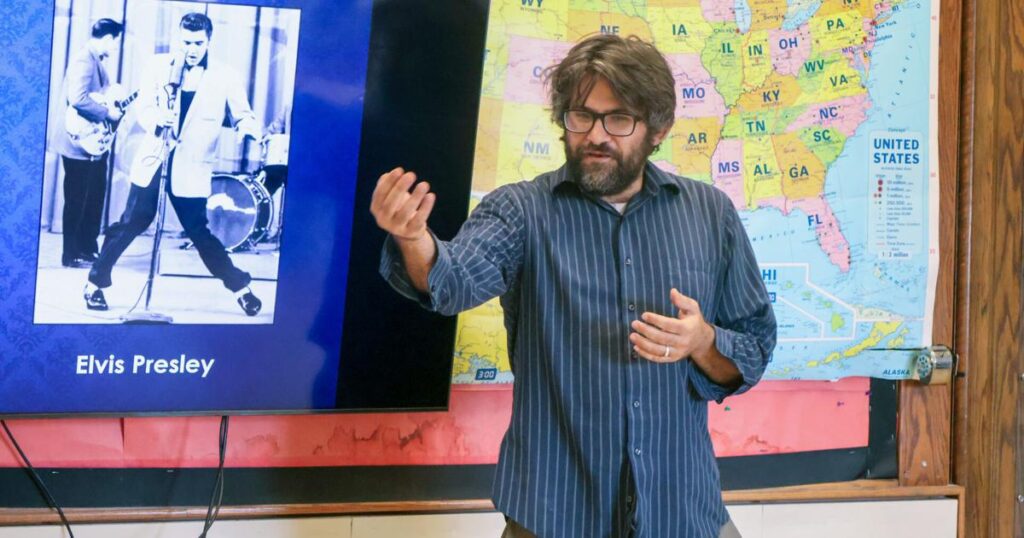In 2012, Uni High alum Ben Leff came to a realization when he returned to his alma mater to teach social studies.
“I had the bizarre experience of becoming colleagues with many of my former teachers,” he said.
Leff doesn’t necessarily teach history conventionally. His courses include U.S. History, American History Through Pop Culture, and Thinking Like a Social Scientist.
Thirteen years into his time at his old school, Leff came to another strange realization.
“I’ve had the more bizarre experience of looking around at the opening in-service and realizing I had become one of the veteran teachers,” he said. “Throughout, I’ve been grateful for my wonderful colleagues.”
I find my work important because … I believe that every person benefits — as a thinker, as a person, and as a citizen — from understanding the history that has shaped their world (this is of course what a social studies teacher would think, but I also believe it to be true!). I find it deeply gratifying to think that my classes were part of hundreds of students’ education.
I became a teacher because … One answer is that I had great role models in my house — both of my parents were excellent, award-winning educators at the University of Illinois who cared deeply about their teaching and their students. I’m also just a huge geek who loves learning and analyzing things, but I also deeply value interpersonal relationships, and feeling like I’m being helpful to others. Teaching is a wonderful way to indulge my intellectual passions while getting the fulfillment of working with students.
My favorite or most unique lesson that I teach is … I love teaching about Reconstruction, this fascinating and important period after the Civil War when Black Americans received something approaching equal rights, before those rights were stripped away — often through violence. But my more “unique” lessons are probably the debate-style role-playing simulations in my U.S. History class, in which students are “playing” historical characters, engaging with one another, and trying to make collective decisions. For example, in one simulation they play Patriots, Loyalists, and Moderates in the run-up to the American Revolution; in another, they are different groups of student activists on the U of I campus in 1970. The students get so into it, and these classes, on top of being fun, facilitate a really valuable intellectual endeavor: putting yourself in someone else’s shoes and understanding their viewpoint and goals.
My most fulfilling moments on the job are when … There may be no place where I get more fully “in the moment” than when I am teaching. And the most invigorating moments are in the lessons when I can tell the students are really “in the moment,” too — for example, when a discussion really “pops.” I’ve also been fortunate to help lead a number of Uni’s annual service trips to the Mississippi Delta, in which students partner with community organizations in Clarksdale, Mississippi. So many students have had meaningful experiences on these trips, and I’m grateful that I’ve gotten to help facilitate that for them.
I keep students engaged by … I’ve been lucky enough to have some very kind students write “thank you” notes over the years (a thoughtful letter means so much to us teachers). One of the most common things they talk about is my energy and enthusiasm. Indeed, I get very excited by the history I teach and the intellectual challenge of designing classes to help students learn. My hope is that some of this excitement spreads to the students.
Something else I’m passionate about is … I’ve had various obsessions in my life — sports, movies, political culture, statistics. And my poor family knows that I love thinking and talking about these things. I also hope my wife, Melissa, and my kids Theo and Lucy know that they are far and away the most important things in my life — more important than any podcast or Illini basketball game!
My favorite teacher and subject to study in school was … I was something of a math geek in high school, but I did love history, too, and my favorite teacher (though there was plenty of competition!) was my U.S. history teacher, Bill Sutton. He was a fantastic history educator who made the past seem interesting and important, and he had really insightful paradigms for interpreting history and society. But even more importantly, he is one of the warmest people I’ve ever met, and he made every student feel like he cared about them personally.
If I weren’t a teacher, I would be … In another universe, I followed my youthful passion for statistics and dove into the world of data analytics or quantitative social science. But honestly, I feel I’d miss the students too much to pursue a career outside the classroom.
— ANTHONY ZILIS

